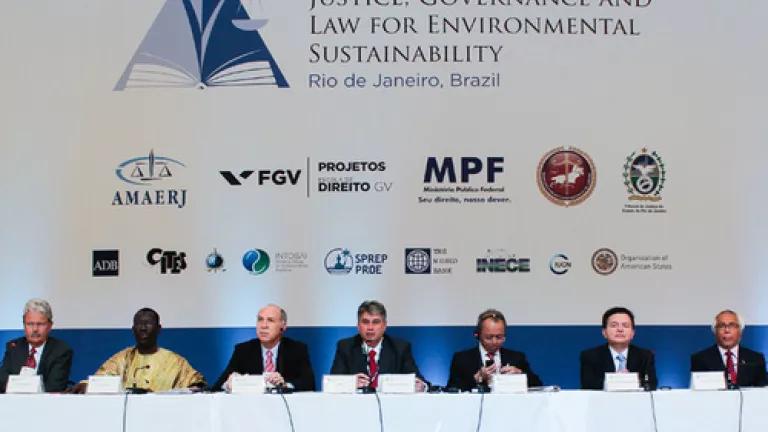
I arrived yesterday in Mangaratiba, Brazil, about an hour down the coast from Rio--and about a meter above sea level--for a relatively small (by international conference standards) gathering of legal experts: the World Congress on Justice, Governance, and Law for Environmental Sustainability, sponsored by the United Nations Environmental Programme (UNEP) and the Brazilian Supreme Court, among others.
No matter what kind of document stems from the Rio+20 Earth Summit, it's not worth the paper it's printed on unless nations take action to make their commitments reality. In many ways, that critical job falls to lawyers and judges. There are nearly 100 judges here from about 60 countries, many of them justices of their native supreme courts, as well as chief prosecutors, attorneys-general and top auditors. These are the people who make the decisions that set the tone of their nation's legal system. They are truly on the front lines of turning environmental commitments into action.
The Executive Steering Committee of the World Congress
As we know all too well, signing an international agreement is one thing--making it happen at home is another. In 2009, the G20 committed to ending fossil fuel subsidies. Then everyone turned around and went home, and nothing happened. In fact, fossil fuel subsidies have tripled since 2009. Why? As we've seen from the Twitter storm over the past few weeks, there is overwhelming public support for ending these subsidies, yet no nation--even "developed" countries with an established tradition of environmental enforcement--has been able to translate that public will into action. Imagine the change we could make in the world if there were more accountability and public participation in decision-making.
As I speak with some of the most influential legal officials from around the world, I'm encouraged by the steps they're taking to improve environmental enforcement in their countries, no matter what part of the world they are from. There's no north-south divide on this issue, no back-and-forth between developed and developing countries. Since they are judges, they’re not advocating for new laws or stronger environmental standards. Instead, they are more interested in increasing public participation and access to the courts, ensuring that existing laws are properly implemented, and providing environmental training for judges to better enforce those laws. The sentiments here remind me of my time in the New York Attorney General's office, when, even as politicians grew further apart on environmental issues, attorneys general from both parties continued to find common ground on the need for enforcement. As James Cameron, founder of Climate Change Capital, remarked in a session: “Good governance does not require good governments.”
I met with judges from Congo and Indonesia, who told me about their special environmental training programs. A Brazilian official mentioned that in auditing all the resources lost by states, they're also looking at natural resources impaired by pollution or degradation, and putting a price on what has been lost. (This is very creative, and something I'd like to see in my home state of New York.) I heard from a Filipino judge that his country is eliminating filing fees and expediting environmental cases, so deep-pocketed polluters cannot simply wear down poor plaintiffs. Many nations have adopted the precautionary principle for environmental cases, which means, in simple terms: better safe than sorry.
This is what protecting the public interest is all about. Legal mechanisms like these give teeth to the laws that defend every person's right to breathe clean air, drink clean water, and protect themselves, their livelihoods, and their families from polluters. Learning about these critical developments gives me hope that no matter what disagreements arise in Rio, the best legal minds in the world are gathered just an hour away, united in their goal for positive change. They are working to turn positive commitments into reality. They are working to give the voice of the people a firm place in the political process.
My role, as one of the few NGO representatives here, is to keep the pressure on. I am urging that the final document recommend specific measures to increase public access to information, such as waiving all fees; enhance the public’s participation in decision-making; improve the capacity of citizens to obtain access to justice and the courts; and ensure that judges are adequately trained and staffed to handle environmental cases. All these mechanisms have been proven to be successful. A justice from India pointed out that many judges enthusiastically endorse the call for “fleshing out” the general goals on public participation espoused in the original Rio agreement.
Rio+20 is about so much more than a document. No matter what the delegates put on a piece of paper, this is a turning point for the planet. Our oceans, our climate, and our communities are already paying the price for decades of inaction, and people are demanding change. I am confident that this World Congress will show that the legal systems of the world are united toward bringing about that change, leading the charge toward a sustainable future.
